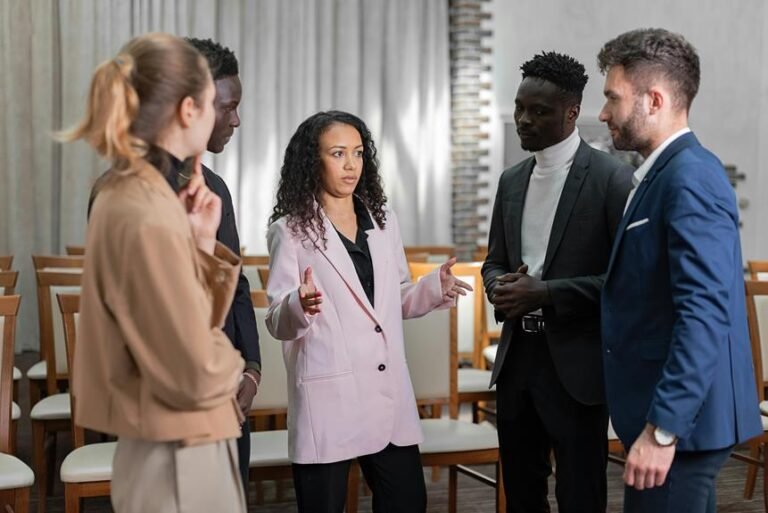Effective Communication Strategies for Couples

In relationships, effective communication is key for understanding, trust, and resolving conflicts. Engage in active listening to truly hear your partner. Express feelings openly to foster connection and validation. Pay attention to nonverbal cues like body language and eye contact to understand unspoken emotions. Practice conflict resolution with compromise and empathy. Building trust through communication strengthens your bond. Remember, setting healthy boundaries and showing empathy are crucial components. Keep exploring for more insights into enhancing your communication strategies as a couple.
Key Takeaways
- Practice active listening to understand your partner fully.
- Use "I" statements to express thoughts and feelings effectively.
- Prioritize empathy to validate and acknowledge your partner's emotions.
- Maintain open dialogue to foster a healthy and strong relationship.
- Address conflicts with patience and compromise for effective resolution.
Importance of Communication in Relationships
Effective communication is the cornerstone of a healthy and successful relationship. Open communication plays a crucial role in understanding each other's needs, feelings, and concerns.
In any relationship, the dynamics between partners are influenced greatly by how openly and honestly they communicate with each other. When you establish a foundation of open communication, you create a safe space for both partners to express themselves freely without fear of judgment.
By fostering open communication in your relationship, you encourage mutual respect and trust to flourish. This, in turn, strengthens the bond between you and your partner, leading to a deeper connection and a greater sense of intimacy.
When you prioritize communication, you show your commitment to understanding each other better, resolving conflicts effectively, and growing together as a couple.
Active Listening Techniques
Engaging in active listening techniques is a fundamental aspect of fostering effective communication and understanding in your relationship. Mindful listening involves fully concentrating on what your partner is saying without interrupting or formulating your response prematurely. By being present in the moment and actively listening to your partner's words, you show them that their feelings and thoughts are valued.
However, communication barriers like distractions, preconceived notions, or emotional triggers can impede this process. To overcome these barriers, practice empathetic responses and reflective listening. Empathetic responses involve acknowledging and validating your partner's emotions, showing that you understand and care about their feelings.
Reflective listening goes a step further by paraphrasing what your partner has said to make sure you've understood correctly and to demonstrate your commitment to truly hearing them.
Effective Expression of Feelings
When it comes to expressing your feelings in a relationship, it's important to communicate openly and honestly with your partner. Sharing your emotions can create a deeper connection and foster understanding between you both. Remember, open dialogue is key to maintaining a healthy and rewarding relationship.
In conversations with your partner, aim to express your feelings in a clear and respectful manner. When you share your emotions, it allows your partner to understand your perspective better. Additionally, emotional validation plays a pivotal role in feeling heard and acknowledged. Your partner's ability to validate your feelings can strengthen the bond you share.
It's essential to create a safe space where both of you feel comfortable expressing your emotions without fear of judgment. Encourage each other to communicate openly and without reservation. By nurturing an environment of trust and emotional openness, you can enhance the emotional connection in your relationship.
Nonverbal Communication Cues
Nonverbal communication cues, like body language and eye contact, are powerful tools in understanding your partner on a deeper level. The way your partner stands, gestures, or looks at you can often speak volumes beyond words. Paying attention to these nonverbal cues can help you tune into their unspoken emotions and thoughts, fostering a stronger connection between you both.
Body language is a key element of nonverbal communication. The way your partner positions their body during a conversation can reveal a lot about their comfort level, interest, or even discomfort. Are they leaning in, showing engagement, or are they crossing their arms, signaling defensiveness?
Eye contact is another essential aspect of nonverbal communication. The eyes are said to be the windows to the soul, and maintaining good eye contact can convey trust, attentiveness, and sincerity. It shows that you're fully present in the moment and actively listening to what your partner has to say.
Conflict Resolution Strategies
Effectively managing conflicts is essential for maintaining a healthy and harmonious relationship with your partner. When disagreements arise, it's important to approach them with care and understanding. Utilizing compromise techniques and de-escalation methods can help diffuse tense situations and foster open communication.
In resolving conflicts, consider different resolution approaches that cater to both your needs and those of your partner. Remember that communication breakdowns can happen, but approaching these challenges with patience and empathy can lead to a stronger bond. It's crucial to actively listen to your partner's perspective and validate their feelings, even if you don't fully agree.
During conflicts, aim to find common ground and work together towards a solution that benefits both of you. Avoid placing blame and instead focus on finding ways to move forward positively. By actively engaging in conflict resolution strategies, you can strengthen your relationship and create a more intimate connection with your partner.
Building Trust Through Communication
To cultivate a strong and lasting bond with your partner, it's essential to prioritize building trust through effective communication strategies. Trust is the foundation of a healthy relationship, and nurturing it requires intentional effort. Engaging in trust-building exercises can help strengthen the connection between you and your partner.
Consider attending communication workshops or relationship retreats together to enhance your understanding of each other and build a deeper level of trust. These opportunities provide a safe space to practice open and honest communication, allowing you to express your thoughts and feelings freely.
In addition to workshops and retreats, seeking guidance from counseling sessions can also be beneficial. A trained professional can help you navigate challenges, improve your communication skills, and work through any underlying issues that may be impacting the trust in your relationship.
Setting Healthy Communication Boundaries
Establishing healthy communication boundaries is vital in fostering a respectful and understanding dynamic in your relationship. Having a boundaries discussion with your partner can help both of you grasp each other's needs and preferences when it comes to communication limits.
It's important to openly express what makes you feel comfortable or uncomfortable during conversations and to listen actively to your partner's boundaries as well.
Remember, setting boundaries isn't about creating distance but about creating a safe space where both of you can communicate openly and honestly. It's okay to establish limits on certain topics or modes of communication if they make either of you feel uneasy.
By respecting each other's boundaries, you show that you value and care for your partner's feelings.
Communication limits can vary from person to person, so it's crucial to have ongoing discussions about boundaries to make sure that both of you feel heard and respected. Regularly checking in on these boundaries can strengthen your relationship and deepen your understanding of each other.
Practicing Empathy and Understanding
Understanding your partner's perspective and showing empathy towards their feelings is key in nurturing a deep connection in your relationship. One way to enhance these qualities is by engaging in empathy exercises and understanding exercises together. These activities can help you both step into each other's shoes, fostering a stronger sense of compassion and connection.
Consider attending communication workshops or relationship retreats as a couple. These settings provide a safe space to practice active listening, validate each other's emotions, and enhance your overall understanding of one another.
Frequently Asked Questions
How Can Couples Overcome Communication Barriers Caused by Cultural Differences?
To overcome communication barriers from cultural differences, prioritize cultural sensitivity. Acknowledge language barriers and aim for cross-cultural understanding. Build empathy by actively listening and seeking to understand your partner's perspective. Embrace diversity to strengthen your connection.
Is It Common for Past Experiences to Affect Current Communication Patterns in Relationships?
It's common for past experiences, like childhood trauma, to shape your current communication patterns in relationships. These can lead to trust issues that impact your dynamic. Understanding this helps in building healthier communication habits together.
What Role Does Technology Play in Modern Couples' Communication Dynamics?
In modern relationships, technology can create a digital disconnect or foster virtual intimacy. Screen time influences emotional connection; finding balance is key. Be mindful of how tech impacts your bond and nurture real communication.
Can Communication Styles Change Over Time in a Long-Term Relationship?
Over time, your communication in a long-term relationship can evolve. Relationship dynamics shape how you interact, leading to changing styles. Embrace this journey together, understanding the long-term impact on your connection.
How Can Couples Navigate Power Dynamics Within Their Communication Strategies?
Managing power dynamics in communication involves recognizing each other's strengths. Assertiveness can be balanced with empathy, fostering compromise. By openly discussing feelings and perspectives, you can create a safe space to address power imbalances and strengthen your connection.
Conclusion
Remember, communication is the key to a strong and healthy relationship. By actively listening, expressing your feelings effectively, and resolving conflicts with empathy and understanding, you can build trust and create a deeper connection with your partner.
Setting boundaries and practicing good communication habits will help you navigate any challenges that come your way. Keep working on your communication skills together and watch your relationship thrive.
You've got this!







4 Comments